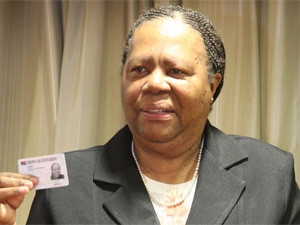
Home affairs minister Naledi Pandor will open three smart ID card offices today. The offices, situated in Pretoria, Johannesburg and Cape Town, have been revamped to contain the necessary infrastructure to allow for the application and issue of the new smart ID card.
As part of the unveiling, Pandor will hand over smart ID cards to a selected number of senior citizens in Pretoria and Johannesburg, while members of the portfolio committee on home affairs will be allowed to apply for their new ID cards at the Cape Town office.
Cabinet ministers, deputy ministers, members of Parliament and media editors will be invited to apply through one of the three offices this week. The Department of Home Affairs (DHA) is in the process of revamping 24 more Department of Home Affairs (DHA) offices across the country, and says these will be unveiled throughout the rest of the year.
Pandor called on South Africans to exercise patience, as the R5.3 billion rollout of smart ID cards will take six to eight years to complete. Rollout to the general public will continue with first-time identity document applicants and senior citizens. Thereafter, other South Africans will be invited to DHA offices in stages, according to dates of birth.
Not immune
While the DHA has repeatedly lauded the smart ID card for its advanced security features, experts have warned successful security will be highly reliant on supporting systems.
Dominic White, CTO of SensePost, says while he has not had an in-depth look into the smart ID card system, the security features seem to be good. However, it does not make it immune to cyber fraud. "Of course, fraudulent IDs will always remain a worthwhile target, and we can be nearly certain that some syndicates will be looking at this closely."
He notes while commentators have pointed out the security risk involved with a central database containing citizens' biometric details, it is not more of a concern than databases containing biometric details already captured for other purposes. "New passports are issued after a capture of electronic biometric data, as are drivers' licences, and the SAPS Automatic Fingerprint Identification System has been going for some time."
White points out that any system is vulnerable to fraudulent misuse by those who know it. "People attempt to reduce this by introducing segregation of duties and reviewing audit logs; however, collusion is always a possibility. As to how vulnerable this system is, it is highly dependent on the specifics of the processes around it, which I am not privy to."
Craig Rosewarne, MD of Wolfpack, warns that South Africans must not be fooled into thinking the more advanced security features of the smart ID card are going to solve all the security challenges, as this is just one part of a bigger security picture that needs to be in place. "We, therefore, hope that the other compensating controls around people, process and technology measures surrounding the smart card lifecycle from development, distribution to ultimately destruction are implemented securely as well," he says.
Share